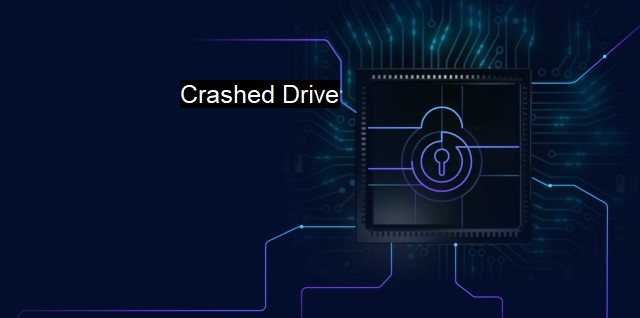What is Crashed Drive?
Cybersecurity Alert: Understanding the Risks and Implications of a Crashed Drive for Users and Businesses
"Crashed Drive" is a term frequently used in the digital world of cybersecurity and antivirus operations to describe a hard drive that has failed or is no longer functioning due to a form of corruption or debilitating damage. Or simply, a crashed drive can refer to situations where the software on the hard drive has become unable to function correctly. Statistically, crashed drives are a pervasive problem that may induce catastrophic data losses and are typically attributable to users' complacency regarding cyber practices.From a cybersecurity perspective, crashed drives are often the result of both hardware malfunctions and software failures, which comprise both viral and non-viral elements. Failures associated with hardware issues may be traced back to manufacturer problems, extensive usage leading to deterioration, or physical damage. Software crashes, on the other hand, are often prompted by malware attacks, corrupted files, power outages while the drive is writing, or improper system shutdowns.
Antivirus operations and crashed drives are intertwined, given that the prime purpose of antivirus software is mitigation against malicious software threats. As part of these operations, antivirus applications function to conduct real-time checks on the data coming in and out of the hard drive. They essentially function as gatekeepers, denying entry to identified threats, thereby reducing the potential cause of a system crash.
Malware, quite often, is a considerable threat to hard drives as they can lead to corruption in the system files, improper operations, and, often, permanent damage. Viruses, worms, ransomware, and other malware can, sometimes subtly, infect a system through emailed attachments, downloads, or even malicious websites. Once they gain access, these malwares corrupt files, overload system resources, alter or delete critical system files leading to a potential hard drive crash.
It is notable to mention here that contemporary antivirus software operate as a counter-measure to all these threats, and much more instigating initiatives to prevent crashing drives. Antivirus scans for these threats, identifies them, quarantines infected files, and repairs the damage, therefore helping decrease the risk of a complete system or hard drive failure.
Antivirus software also functions as an invaluable preventive measure against malware induced hard drive crashes by offering real-time threat identification and neutralization. It may also feature automated updating functions which ensure the antivirus software is kept up-to-date with the latest malware threats and vulnerabilities, extending its preventive operations.
Nonetheless, the realm of crashed drives is not solely confined to viruses and malware. Hardware problems, inefficiencies in system performance, segmentation faults, power interruptions, improper maintenance of the drive, all can lead to hard drive crashes independently, or in concert, which fall outside the purview of antivirus interjections.
Crashed drives are serious events that breed disruption; they can even become critically catastrophic from a business perspective. Businesses encounter extensive downtime not just because of system inoperabilities, but also because data loss may broach into business-critical records, proprietary information, intellectual property, inter alia. Aside from direct business consequences, hard drive crashes induced by cyber attacks often lead to other damages like fines, legal complications, customer loss driven by reputational harm.
a crashed drive is a significant concern in both cybersecurity and antivirus landscapes. While antivirus software significantly mitigates against this undesirable event, it is critical for users to engage in appropriate digital hygiene practices including regular system backups, meticulously regulating the physical environment of drives, regular maintenance checks to ensure longevity. It is a collective defense approach, an amalgamation of robust antivirus measures, cybersecurity best practices and judicious user behavior that can prevent a hard drive crash, save your digital space from collapsing, hence ensuring seamless operating experience and data security.

Crashed Drive FAQs
What is a crashed drive?
A crashed drive refers to a hard disk drive that is physically or logically damaged, preventing it from functioning properly. It can result in the loss of data and system failure on the device.Can antivirus software prevent a drive from crashing?
Antivirus software cannot prevent a drive from crashing, but it can protect your device against viruses and malware that can cause the crash. Regularly scanning your device with antivirus software can detect and remove any potential threats that could damage your system.How can I recover data from a crashed drive?
Data recovery from a crashed drive is a complex process that requires technical expertise. It is recommended to seek the services of a professional data recovery company to recover your lost data. Attempting to recover data on your own can cause further damage to the device and make the data recovery process more difficult.What can I do to prevent a drive from crashing?
To prevent a drive from crashing, it is important to regularly back up important data to an external storage device or cloud-based service. This ensures that you have a copy of your data in case of a system failure. Additionally, keeping your device updated with the latest security patches and avoiding suspicious downloads and websites can help protect against viruses and malware that can damage your system.| | A | | | B | | | C | | | D | | | E | | | F | | | G | | | H | | | I | | | J | | | K | | | L | | | M | |
| | N | | | O | | | P | | | Q | | | R | | | S | | | T | | | U | | | V | | | W | | | X | | | Y | | | Z | |
| | 1 | | | 2 | | | 3 | | | 4 | | | 7 | | | 8 | | |||||||